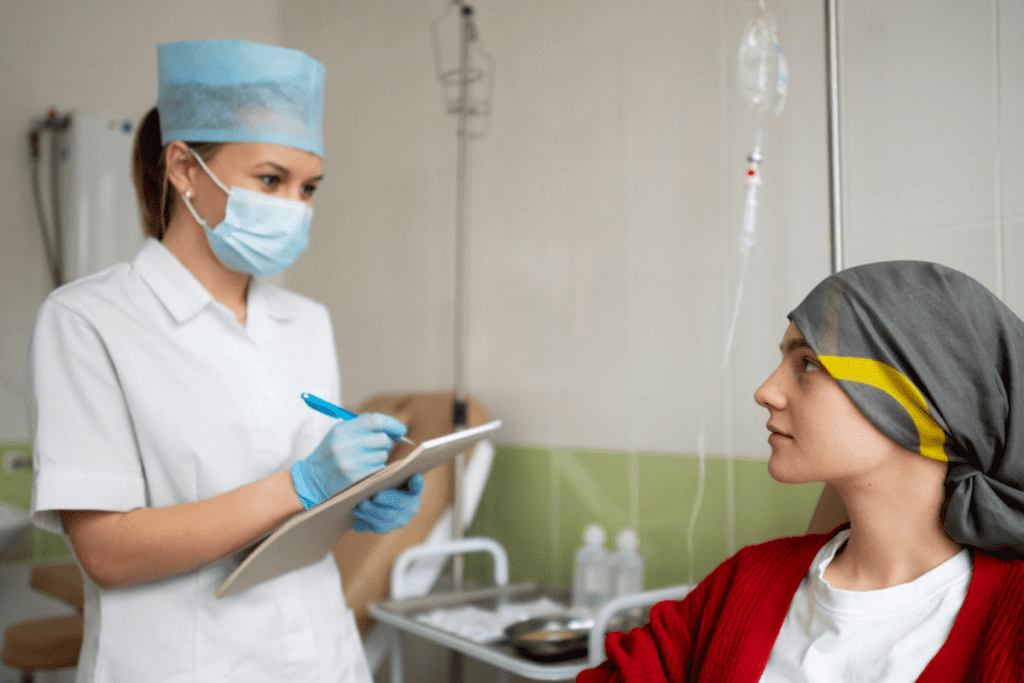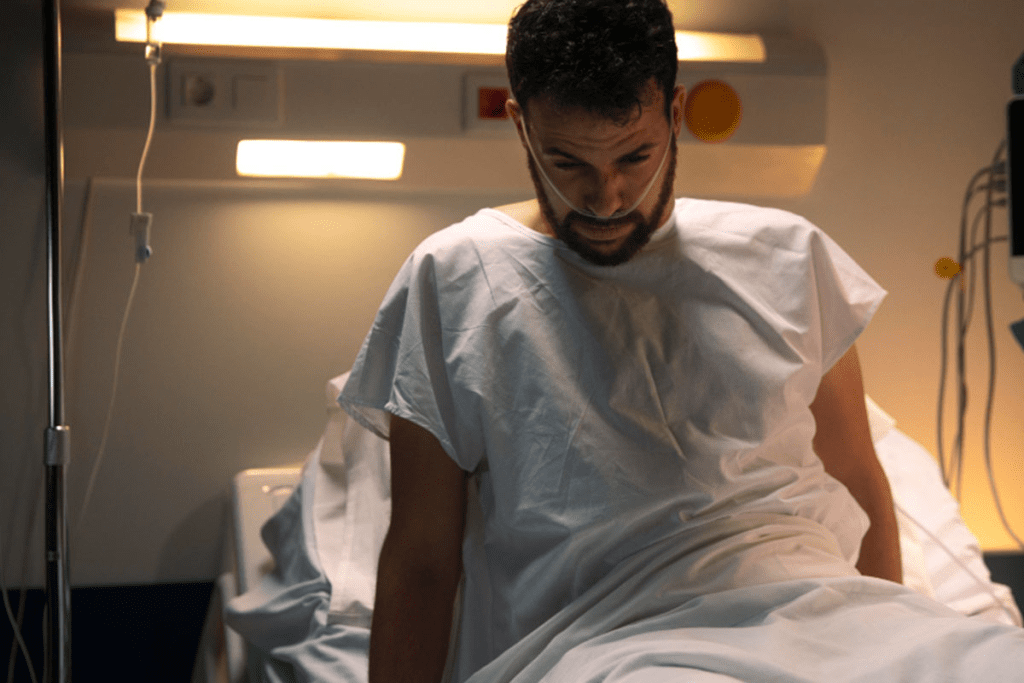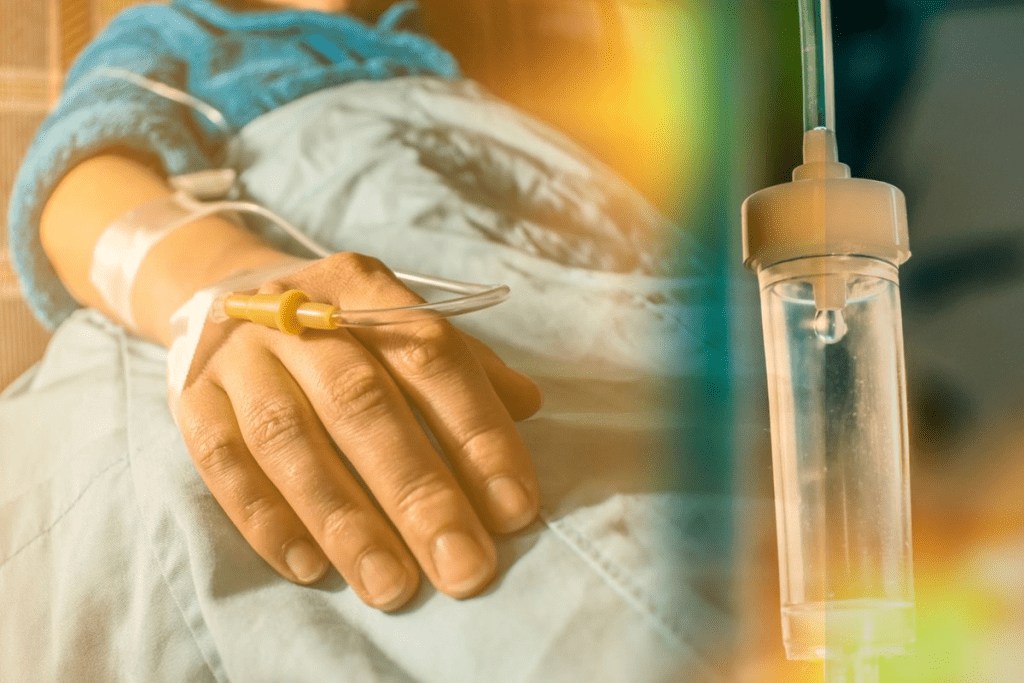Last Updated on October 20, 2025 by

When you’re on chemotherapy, precautions for family members at home, you must follow strict precautions to stay safe. Simple tasks can become risky because your immune system is weak.
Chemotherapy kills cancer cells but also harms healthy ones, causing side effects. It’s important to avoid infections and bleeding.
It’s key to avoid infections and crowded places. This is because neutropenia, a common side effect, lowers your white blood cell count.
Chemotherapy is a key treatment for many cancers. Patients need to know how it works and its effects. Chemotherapy uses drugs to kill or slow down cancer cells.
Chemotherapy drugs target fast-growing cells, like most cancer cells. But, they also harm healthy cells that grow quickly. This can cause side effects, some of which are serious.

Side effects of chemotherapy include fatigue, nausea, hair loss, and a higher risk of infections. Up to 35% of patients get neutropenia, a low white blood cell count. These effects can make daily life hard, forcing patients to change their routines and take extra precautions.
“Managing the side effects of chemotherapy is key to keeping patients’ quality of life high.”
It’s vital to follow safety guidelines to lessen chemotherapy risks and manage side effects. This means staying away from crowded areas, keeping clean, and choosing safe foods. By doing this, patients can handle their treatment better and lower the chance of problems.
Patients on chemotherapy face higher risks of getting infections. This is why taking precautions is key. Chemotherapy can cause neutropenia, a drop in neutrophils, which are white blood cells that fight off infections.
Neutropenia is a common side effect of chemotherapy. It weakens the immune system. This makes patients more likely to get infections, which can be serious and even deadly. Knowing about neutropenia’s risks is important for managing its effects.
It’s important to avoid crowded areas during chemotherapy. Places like buses, malls, and big events are full of germs. By staying away, patients can lower their chance of getting sick.
It’s also key to limit contact with people who are sick. Even small illnesses like the cold or flu can be dangerous for those on chemotherapy. Patients should keep their distance from anyone who’s not feeling well to avoid getting sick.
Family members are key in caring for someone going through chemotherapy. It’s important to know how to keep the home safe. A few simple steps can make a big difference in helping the patient get better.
To keep the patient safe and comfortable, focus on a clean home. This means:
Good hygiene is key to avoiding infections. Frequent handwashing is a must. Also, remember to:
It’s hard to limit visitors, but it’s necessary. Here’s how to do it safely:
When dealing with the patient’s laundry and personal items, be careful. This means:
By following these tips, family members can make a safe space at home. This helps the patient recover better during chemotherapy.
When you’re going through chemotherapy, it’s important to think about the activities you do. Chemotherapy can make it harder for your body to heal and can lower your energy. It also affects your physical health.
Playing contact sports or doing high-impact activities can be risky. Sports like football and basketball have a chance of causing injuries. Running or jumping can also strain your body, making it more likely to get hurt.

Stay away from activities that could lead to bleeding or injury during chemotherapy. This includes weightlifting and activities with sharp objects, like some crafts or cooking methods. These can cause cuts or strains.
Even though some activities are off-limits during chemotherapy, you don’t have to stop moving altogether. Look for safe exercise alternatives that keep you active without the risk of injury. Gentle yoga, walking, or light stretching are good choices that fit your energy and health.
Always listen to your body and talk to your doctor before starting or continuing any exercise during chemotherapy. They can give you advice tailored to your treatment and health.
Dietary restrictions are key to safe and effective chemotherapy. A balanced diet is important, but some foods can be risky for patients on chemo.
Patients on chemo should stay away from raw or undercooked foods. These can harbor harmful pathogens. Raw meat, eggs, and seafood are high-risk.
These foods can carry Salmonella and E. coli. These bacteria can cause serious illnesses in people with weakened immune systems.
Some foods have high bacteria levels and should be avoided during chemo.
These foods can have Listeria, a dangerous bacterium for chemo patients.
Some foods can affect how well chemo drugs work. Grapefruit and its juice, for example, can interfere with certain drugs.
“It’s essential for patients to discuss their diet with their healthcare provider to avoid any possible interactions between food and chemotherapy drugs.”
By knowing which foods to avoid, patients can reduce risks and make their chemo treatment more effective.
It’s important to know how alcohol and other substances affect chemotherapy. Chemotherapy is a complex treatment. It needs careful thought to work well and have fewer side effects.
Drinking alcohol while on chemotherapy can harm treatment results and health. Alcohol can mess with the liver’s job of breaking down chemotherapy drugs. This might make the drugs less effective or more toxic.
Also, alcohol can make common side effects like tiredness, nausea, and vomiting worse. It’s key for patients to talk to their doctor about drinking. This helps understand the risks for their treatment.
The time to avoid alcohol after chemotherapy changes based on the drugs and the patient’s health. Usually, patients are told not to drink alcohol during treatment and for some time after. This helps the body heal and avoids bad interactions with drugs.
Doctors can give advice based on the patient’s treatment and health.
Other things, like some medicines, herbal supplements, and fun drugs, can also be a problem. Patients should tell their doctor about all substances they use or plan to use during chemotherapy.
Knowing about these risks and avoiding harmful substances helps chemotherapy work better. It also reduces risks for patients.
Some supplements and medications can be harmful when mixed with chemotherapy drugs. It’s key to know what to stay away from. Patients often get medicines to handle side effects or other health issues during chemo. But some can mess with how well chemo works or raise the chance of bad side effects.
Vitamin supplements help keep us healthy, but be careful with them during chemo. Vitamins A, D, E, and K can build up in the body and affect chemo drugs. For example, too much vitamin C can mess with some chemo meds. Always talk to a doctor before taking vitamins.
Herbal remedies and natural products seem safe, but they can be strong and interact with chemo. St. John’s Wort can make some chemo drugs less effective, and ginkgo biloba can up the risk of bleeding. Tell your doctor about any herbal or natural products you’re using during chemo.
OTC meds like pain relievers and antihistamines help with symptoms. But some can react with chemo drugs. For instance, NSAIDs like ibuprofen can up the risk of bleeding with certain chemo meds. Always check with your doctor before taking OTC meds.
It’s best to talk to a healthcare provider about supplements and meds during chemo. They can give advice tailored to your situation. Keep a list of all supplements and meds you’re taking to discuss with your doctor.
Key Considerations:
Being informed and careful can help avoid risks and make sure chemo works well.
Chemotherapy can make it hard to focus and react quickly. This is because it affects how well you can drive or use machinery. Patients need to know their limits and the dangers of these activities.
Chemotherapy leads to fatigue, which is extreme tiredness that doesn’t get better with rest. It also causes concentration issues and slower reaction times. These problems make it unsafe to drive or use machinery.
Figuring out when it’s okay to drive while on chemotherapy depends on many things. These include the type of chemotherapy, your health, and how you react to it. It’s very important to listen to your healthcare providers. They can tell you when it’s safe to drive based on your situation.
If you can’t drive or use machinery, finding other ways to get around is key. You might use public transport, ride-sharing, or ask family and friends for a ride.
It’s also important to think about the legal and insurance issues of driving or using machinery while on chemotherapy. Driving against a doctor’s orders can lead to legal trouble, even if you’re not at fault in an accident.
Check with your insurance to see what they say about driving during chemotherapy. Some policies might have special rules for these situations.
Handling chemotherapy drugs safely is key to everyone’s health. These drugs target cancer cells but can harm healthy cells too. So, it’s a risky job.
Some chemotherapy pills can get into your body through your skin or when you breathe them in. It’s vital to avoid touching these pills to stay safe. Caregivers should wear gloves, and patients need to know how to handle their meds safely at home.
Getting rid of unused or expired chemotherapy drugs is important. Follow the disposal rules given by doctors or pharmacists. This usually means taking them back to a pharmacy or a special disposal site.
Family members can get exposed to chemotherapy drugs through the patient’s fluids or contaminated things. To lower this risk, follow strict cleaning habits. Wash hands often, use disposable gloves for patient waste, and wash clothes and linens separately.
By sticking to these safe handling tips, patients and their families can lower the dangers of chemotherapy. This makes a safer space for everyone.
Following medical advice is key for those getting chemo therapy. It helps avoid risks and complications. Chemo therapy is a detailed treatment that needs careful handling for safety and effectiveness.
The American Society of Clinical Oncology (ASCO) and the National Comprehensive Cancer Network (NCCN) offer guidelines for chemo therapy patients. These guidelines cover treatment options, supportive care, and follow-up.
ASCO and NCCN guidelines are made by oncology experts. They are based on the latest research and data. Following these guidelines helps patients get care that fits their needs.
Chemo therapy patients should know when to call their doctor right away. Symptoms like fever, severe pain, or trouble breathing need quick attention.
Vaccination guidelines are important to prevent infections during chemo therapy. Patients should talk to their doctor about recommended vaccinations and when to get them.
Live vaccines are usually not recommended during chemo therapy because of the risk of complications. But, killed or inactivated vaccines might be suggested to protect against certain infections.
Each chemo therapy drug has its own side effects and needs. Patients should know the special precautions for their treatment.
For example, some chemo therapy drugs need special handling and administration procedures. This is to reduce the risk of exposure to family and caregivers.
It’s key for patients to balance life during chemo therapy. Knowing the precautions and making lifestyle changes helps. This way, patients can reduce risks and have a smoother treatment.
Chemo therapy needs careful planning and following rules to avoid problems. Patients should know what activities to skip, what foods to avoid, and how to handle meds safely. This protects them and their loved ones.
By making smart lifestyle changes and following precautions, patients can keep their quality of life high. This lets them face chemo therapy’s challenges with confidence. It helps them focus on getting better and making the most of their treatment.
Avoid raw and undercooked foods to prevent foodborne illnesses. High-bacteria risk foods are also a no-go. Some foods can interact with chemo therapy drugs. Always follow dietary guidelines.
No, it’s best to avoid alcohol during treatment. It can affect how well the chemo therapy works and your liver.
Some vitamins, herbal remedies, and natural products can interact with chemo therapy drugs. Always check with your healthcare provider before adding anything new to your routine.
Handling chemo therapy pills requires care to avoid exposure and secondary exposure to others. Some pills can be absorbed through the skin. Always handle them safely.
The time to wait varies based on the chemo therapy type and individual factors. Always ask your healthcare provider for specific advice.
Gentle yoga or walking are good options to stay active. Avoid contact sports and high-impact activities to prevent injuries and bleeding.
Create a safe home by following good hygiene practices. Manage visitors and handle the patient’s laundry and personal items safely.
Call your healthcare provider right away for severe side effects like neutropenia or any treatment concerns.
Chemotherapy can make it hard to drive or operate machinery due to fatigue and concentration issues. Be aware of your limits and find alternative ways to get around.
Some drugs, like capecitabine, need special care. Follow dietary restrictions and safe handling practices. Always get guidance from your healthcare provider.
Subscribe to our e-newsletter to stay informed about the latest innovations in the world of health and exclusive offers!